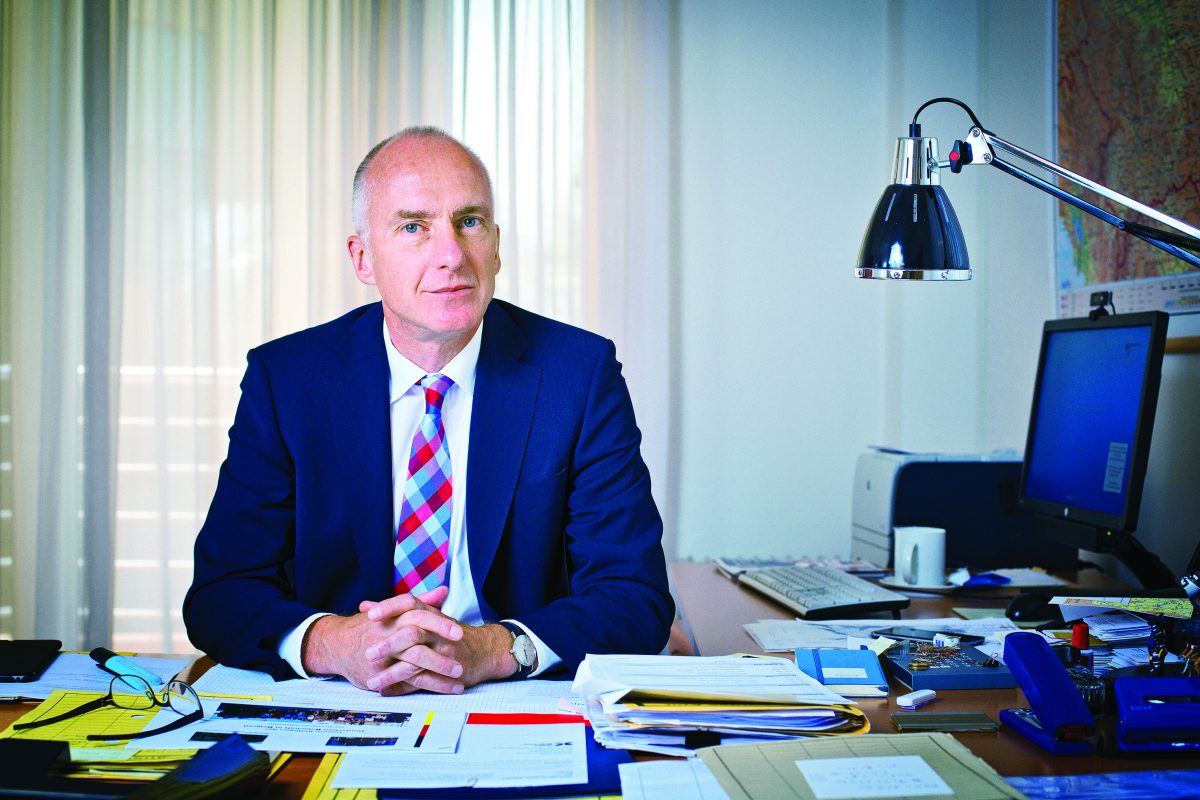When I started as German ambassador in 2018, the number of jobs created by German companies was 48,000. Today, 2 ½ years later, this number is around 68,000. It is also very positive that the quality of created jobs has changed – German companies offer more and more job opportunities for a highly qualified workforce, like engineers and IT experts
In the last 20 years, the German government, together with its institutions KfW and GIZ, has implemented projects worth two billion euro in Serbia. German companies have an exceptional influence on the entrepreneurial spirit and work habits, as well as on the development of dual education in our country. For the jubilee issue of InFocus Germany, we spoke with the German Ambassador in Serbia, H.E. Thomas Schieb, about further cooperation between the two countries.

Economic relations between Germany and Serbia are at an exceptional level, which is a good basis for further improvement of the overall relations. In which segments can the cooperation between our two countries become even better?
Our bilateral and economic relations are flourishing indeed. This is true for our bilateral trade as well as for investments of German companies. The trade has been growing constantly, even during the pandemic, and the level of activities of German businesses in Serbia has exponentially increased. Today, we count more than 2.5 billion euros of total investments since the year 2000.
When I started as the German ambassador in 2018, the number of jobs created by German companies was 48,000. Today, 2 ½ years later, this number is around 68,000. It is also very positive that the quality of created jobs has changed – German companies offer more and more job opportunities for a highly qualified workforce, like engineers and IT experts. A number of companies established state-of-the-art R&D centres. Such investments might create fewer jobs than those in more labour intensive sectors. However, they show the companies’ intention to stay long-term.
The trade has been growing constantly, even during the pandemic, and the level of activities of German businesses in Serbia has exponentially increased
It is good that the Serbian government intends to put more focus on the so-called green agenda, i.e. investing in climate protection and air pollution measurements as well as water- and wastewater infrastructure as well as in renewable energy and energy efficiency of buildings. As one of the pioneers in green engineering solutions and the energy transition (we call it “Energiewende”), Germany has the know-how as well as climate and environmental friendly solutions to offer. These sectors have a huge potential for enhanced cooperation.
Germany strongly supports Serbia in the European accession process. What determines how fast a candidate country will join the EU and what should be the priority of the Serbian Government in that context?
Serbia is as a fellow European country, which should become member of the EU sooner rather than later. Once a candidate country has adopted the complete legal framework of the EU, the so-called Acquis Communautaire, it is ready for accession. This includes the country fully aligning itself with foreign policy positions of the EU, and overcoming unresolved disputes with its neighbours, i.e. with Kosovo.
Whereas some parts (so-called chapters) of the Acquis are rather technical in nature, others touch upon core principles of the EU, i.e. those related to the rule of law. Since there has been a lack of progress in the field of rule of law, particularly in improving media freedom and independence of the judiciary as well as in the fight against corruption, there was very little progress in terms of EU accession last year. Substantial progress is necessary in all these fields.
What do you think about the relations between the EU and the new U.S. administration, helmed by President Joe Biden. Which direction will they take?
President Biden expressed his determination and willingness to cooperate and engage with international partners and multilateral organizations. It is excellent to see the US back in the WHO, to mention just one prominent example. In times of a raging global pandemic, we need worldwide cooperation and inspired leadership on both sides of the Atlantic more than ever. I am convinced that we will see new impetus for the trans-Atlantic relations, both on the EU and bilateral levels.
The dialogue between Belgrade and Priština is a very important topic as it is part of the European integration process to and also important for the entire region of the WB. What direction will the related initiatives take to move the entire region closer towards the EU?
Normalisation of relations between Serbia and Kosovo would be extremely positive for many reasons. It would help unleash the full economic potential not only of the parties but the whole region and the people of the region would benefit enormously. It would also be a huge step forward on the path towards EU membership. Once a new government is in place in Priština, we expect the dialogue under the auspices of EU Special Representative Lajčák to resume with new momentum. It goes without saying that both parties need to have a constructive attitude to make progress.
It is good that the Serbian government intends to put more focus on the so-called green agenda, i.e. investing in climate protection and air pollution measurements
In the last 20 years, the German government, together with its institutions KfW and GIZ, has implemented projects worth two billion euro in Serbia. What will be the focus this year and in the years to come?
Our development cooperation follows a more long-term perspective, rather than focusing on short-term impacts. Hence, our overarching goal is to support Serbia on its European path. In the next years, we will focus on the provision of vocational training and the creation of jobs for young people in particular, the expansion of renewable energy sources, like wind and solar energy, and the provision of expertise in the area of rule of law. Improvements in the rule of law are, as I said earlier, particularly important for progress towards EU membership. Additionally, we support the Roma community by helping to rehabilitate basic infrastructure, such as water and sewage grids in informal settlements or through awareness-raising and educational programmes.
German companies have an exceptional influence on the entrepreneurial spirit and work habits, as well as on the development of dual education in our country. What else can we learn from the Germans and vice versa?
As an ambassador, it’s not my job to lecture. My advice would be, to Germans as to Serbians alike, to find out themselves what they can learn from each other. This is why the German embassy is supporting and facilitating exchange between the German and Serbian people on many levels. What one country might learn from another, what an individual can learn from his or her friends and neighbors, is best discovered in direct communication. I hope, that, once the pandemic is defeated, many Serbs will visit Germany and many Germans will travel to Serbia again to experience what the other country has to offer.
I am impressed by the Serbian ability to make do in a rapidly changing environment. Germans have a tendency to plan everything well in advance
One additional remark… I am impressed by the Serbian ability to make do in a rapidly changing environment. Germans have a tendency to plan everything well in advance. However, sometimes a bit more flexibility might be useful.
The 30th anniversary of the German reunification was marked on 3rd October 2020. Have any planned celebration activities been postponed for this year and how did Germany mark this jubilee?
In Germany, the Day of German Unity celebration ceremony had to be re-arranged at short notice. Instead of thousands of people celebrating the 30th anniversary, as in normal times, a modest outdoor exhibition with a limited number of guests took place in Potsdam.
I very much regret that we were not able to celebrate 30 years of German unity last year here Belgrade, in the way we had planned. We were looking forward to including the festivities in a series of cultural events called “German Weeks”. If the situation with the coronavirus allows it, we will hold the German Weeks this autumn, and also open the doors of our brand new embassy building in Knez Miloš Street to the public.

Friendly and Welcoming
What do you like most in Serbia and Belgrade in particular?
The hospitality I have been experiencing since coming to Serbia is exceptional and the people are very friendly and welcoming. I very much like the humour and the talent for improvisation that we Germans sometimes lack. Belgrade is such a lively, interesting city. My wife and I are very much looking forward to enjoying the uniquely vibrant cultural scene again, once the pandemic is conquered. Given the impressive progress of the vaccination campaign in Serbia, the prospects for this are not so bad. However, for the time being, extreme caution and complying with the distance and hygiene rules are of pivotal importance.